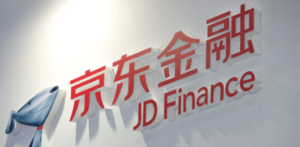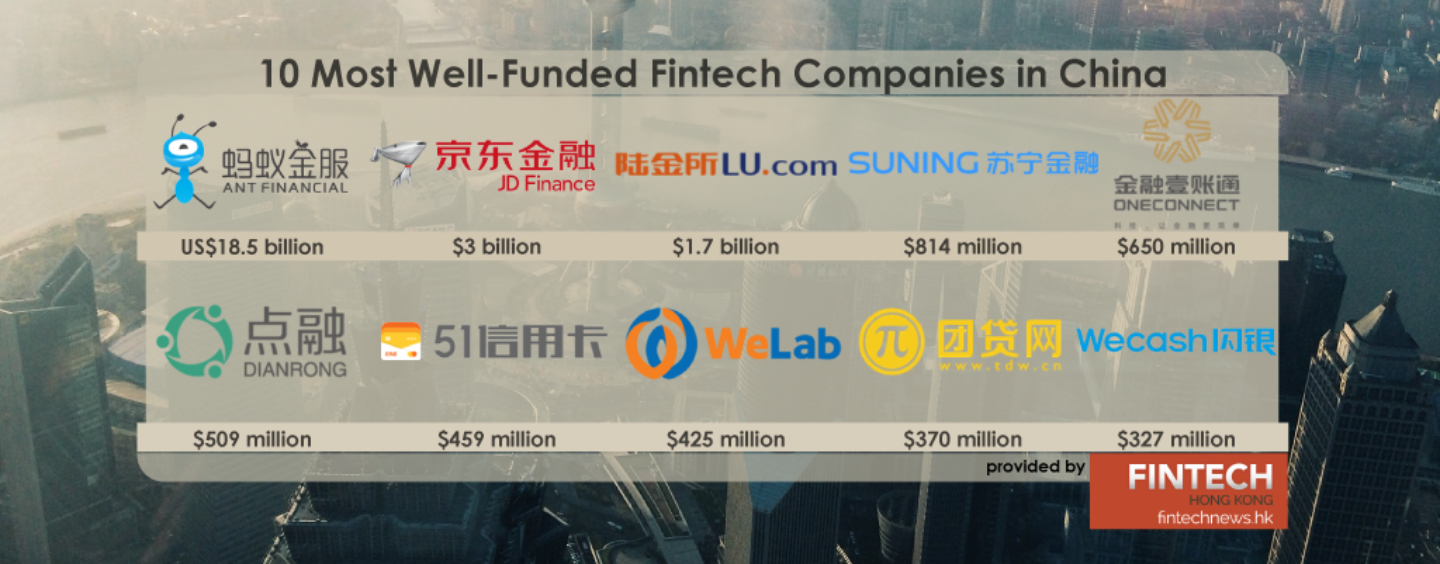China is undeniably the world’s fintech leader, hosting some of the largest and most popular ventures in the field. More than US$20 billion has been invested in Chinese fintech companies since 2014 with funding topping US$1 billion in Q1 2018 alone, according to Fintech Global.
These are ten of China’s most well-funded fintech companies (based on disclosed funding):
Ant Financial – US$18.5 billion
 Ant Financial Services Group, an affiliate company of the Chinese Alibaba Group, is one of the world’s largest online financial services companies and the highest valued fintech company in the world with a valuation of upwards of US$110 billion. It operates Alipay, the world’s largest mobile and online payments platform as well as Yu’e Bao, the world’s largest money-market fund. It also runs the Sesame Credit credit rating system. Ant Financial has raised US$18.5 billion in disclosed funding: US$4.5 billion in its Series B in 2016, and most recently US$14 billion in its Series C, according to TechCrunch.
Ant Financial Services Group, an affiliate company of the Chinese Alibaba Group, is one of the world’s largest online financial services companies and the highest valued fintech company in the world with a valuation of upwards of US$110 billion. It operates Alipay, the world’s largest mobile and online payments platform as well as Yu’e Bao, the world’s largest money-market fund. It also runs the Sesame Credit credit rating system. Ant Financial has raised US$18.5 billion in disclosed funding: US$4.5 billion in its Series B in 2016, and most recently US$14 billion in its Series C, according to TechCrunch.
JD Finance – US$3 billion
 JD Finance is the fintech arm of China’s e-commerce giant JD.com. It was established in 2013 to give individuals and businesses quick, easy and convenient access to the financial services they need. JD Finance has established seven major business lines: supply chain finance, consumer finance, crowdfunding, asset management, payment solutions, insurance and securities. Its services include JingBaobei (microloan platform), Baitiao (crowd funding platform), Jintiao and Xiaobai (wealth management services). JD Finance raised US$2 billion, its latest funding round in March 2018.
JD Finance is the fintech arm of China’s e-commerce giant JD.com. It was established in 2013 to give individuals and businesses quick, easy and convenient access to the financial services they need. JD Finance has established seven major business lines: supply chain finance, consumer finance, crowdfunding, asset management, payment solutions, insurance and securities. Its services include JingBaobei (microloan platform), Baitiao (crowd funding platform), Jintiao and Xiaobai (wealth management services). JD Finance raised US$2 billion, its latest funding round in March 2018.
Lufax – US$1.7 billion
 Shanghai Lujiazui International Financial Asset Exchange (Lufax) is an online Internet finance marketplace and one of China’s largest internet finance companies. Lufax was incorporated in September, 2011 in Shanghai and started with peer-to-peer lending. It has since branched out its business, becoming a much broader platform that works together with funds, insurance companies and financial license holders. Lufax has raised US$1.7 billion in funding so far: a US$485 million Series A funding round in 2015 and a US$1.2 billion Series B funding round in 2016, according to Crunchbase. It is now looking to raise up to US$2 billion in fresh funding.
Shanghai Lujiazui International Financial Asset Exchange (Lufax) is an online Internet finance marketplace and one of China’s largest internet finance companies. Lufax was incorporated in September, 2011 in Shanghai and started with peer-to-peer lending. It has since branched out its business, becoming a much broader platform that works together with funds, insurance companies and financial license holders. Lufax has raised US$1.7 billion in funding so far: a US$485 million Series A funding round in 2015 and a US$1.2 billion Series B funding round in 2016, according to Crunchbase. It is now looking to raise up to US$2 billion in fresh funding.
Suning Financial Services – US$814 million
![]() Suning Financial Services is part of Suning Holdings. The company provides payment accounts, investment banking, consumer loans, corporate loans, insurance, crowdfunding, private equity financing and other financial services, serving both consumers and businesses. Suning Financial Services has raised US$814 million in funding so far, according to Crunchbase.
Suning Financial Services is part of Suning Holdings. The company provides payment accounts, investment banking, consumer loans, corporate loans, insurance, crowdfunding, private equity financing and other financial services, serving both consumers and businesses. Suning Financial Services has raised US$814 million in funding so far, according to Crunchbase.
OneConnect Financial Technology – US$650 million
 OneConnect Financial Technology, formerly known as Ping An Financial Technology Consulting Co., Ltd. Shenzhen, focuses on fintech solutions for small and medium-sized banks. OneConnect has built four service platforms based on big data, blockchain, financial cloud, intelligent finance and other new technologies. The four platforms, namely Direct Bank Cloud, Financial Cloud for small and micro enterprises, Interbank Asset Transaction and Personal Credit Investigation, aims to provide financial institutions with a comprehensive portfolio of fintech solutions. OneConnect has raised US$650 million in funding so far, according to Crunchbase.
OneConnect Financial Technology, formerly known as Ping An Financial Technology Consulting Co., Ltd. Shenzhen, focuses on fintech solutions for small and medium-sized banks. OneConnect has built four service platforms based on big data, blockchain, financial cloud, intelligent finance and other new technologies. The four platforms, namely Direct Bank Cloud, Financial Cloud for small and micro enterprises, Interbank Asset Transaction and Personal Credit Investigation, aims to provide financial institutions with a comprehensive portfolio of fintech solutions. OneConnect has raised US$650 million in funding so far, according to Crunchbase.
Dianrong – US$509 million
 Dianrong is an online marketplace lending company serving individuals and small and medium-sized enterprises. Named the “Lending Club of China”, the company was founded in 2012 and specializes in small consumer and business loans, ranging in size from 2,500 to 500,000 RMB for personal loans and 50,000 to 2,000,000 RMB for small business loans. Dianrong has raised US$509 million in funding so far, the latest being its US$290 million Series D.
Dianrong is an online marketplace lending company serving individuals and small and medium-sized enterprises. Named the “Lending Club of China”, the company was founded in 2012 and specializes in small consumer and business loans, ranging in size from 2,500 to 500,000 RMB for personal loans and 50,000 to 2,000,000 RMB for small business loans. Dianrong has raised US$509 million in funding so far, the latest being its US$290 million Series D.
51Xinyongka – US$459 million
 51Xinyongka (U51.com) assists users to better manage their credit card bills via a mobile application. It also provides wealth management products, online loan applications and other personal credit-based services in a holistic manner to better serve their customer base. The app has had over 36 million downloads since launch, managing more than 35 million credit cards. It claims to manage the bills of around 20% of China’s most active credit card users. U51.com has raised US$459 million in funding so far, according to Crunchbase.
51Xinyongka (U51.com) assists users to better manage their credit card bills via a mobile application. It also provides wealth management products, online loan applications and other personal credit-based services in a holistic manner to better serve their customer base. The app has had over 36 million downloads since launch, managing more than 35 million credit cards. It claims to manage the bills of around 20% of China’s most active credit card users. U51.com has raised US$459 million in funding so far, according to Crunchbase.
WeLab – US$425 million
 Founded in 2013 in Hong Kong, WeLab is a leading fintech startup specialized in peer-to-peer lending. The firm operates several online lending platforms including Wolaidai, one of China’s leading mobile leading platforms, and WeLend, Hong Kong’s largest online lending platform. WeLab’s lending platforms are powered by WeDefend, the company’s proprietary risk management technology, which combines machine learning, big data technologies, and unstructured data to deliver a streamlined risk management and customer experience.
Founded in 2013 in Hong Kong, WeLab is a leading fintech startup specialized in peer-to-peer lending. The firm operates several online lending platforms including Wolaidai, one of China’s leading mobile leading platforms, and WeLend, Hong Kong’s largest online lending platform. WeLab’s lending platforms are powered by WeDefend, the company’s proprietary risk management technology, which combines machine learning, big data technologies, and unstructured data to deliver a streamlined risk management and customer experience.
Tuandaiwang – US$370 million
 Tuandaiwang is a Chinese peer-to-peer lending company that offers a group loan network loan investment platform. Launched in 2012, Tuandaiwang enables users to lend their savings at a higher investment return rate than traditional saving rates. The platform claims that individuals and companies have borrowed around RMB 78 billion (US$11.4 billion) since launching and lenders can make as much as RMB 2.3 billion (US$335 million) in returns. Tuandaiwang has raised about US$370 million in funding so far, according to Crunchbase.
Tuandaiwang is a Chinese peer-to-peer lending company that offers a group loan network loan investment platform. Launched in 2012, Tuandaiwang enables users to lend their savings at a higher investment return rate than traditional saving rates. The platform claims that individuals and companies have borrowed around RMB 78 billion (US$11.4 billion) since launching and lenders can make as much as RMB 2.3 billion (US$335 million) in returns. Tuandaiwang has raised about US$370 million in funding so far, according to Crunchbase.
Wecash – US$327 million
 Wecash is a China-based big data credit assessment platform. Wecash uses machine-learning algorithms to provide credit assessments in less than 15 minutes, and is able to build predictive models for customers’ credit risk. Its platform evaluates consumer credit for loans in 3C, agriculture, aesthetic medicine, home rental, cars, insurance, and travel. Wecash has raised US$327.9 million in funding so far, according to Crunchbase.
Wecash is a China-based big data credit assessment platform. Wecash uses machine-learning algorithms to provide credit assessments in less than 15 minutes, and is able to build predictive models for customers’ credit risk. Its platform evaluates consumer credit for loans in 3C, agriculture, aesthetic medicine, home rental, cars, insurance, and travel. Wecash has raised US$327.9 million in funding so far, according to Crunchbase.
Other resources you might be interested in
Check out our resource page to find out what are the top funded fintechs in countries like — Singapore, Malaysia, Indonesia, Philippines, India, China, Hong Kong, Taiwan, Korea and Japan










